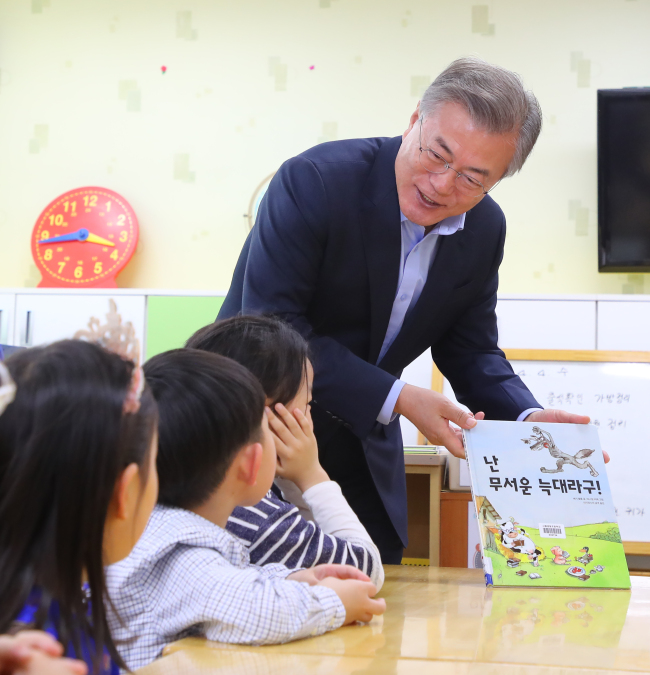Government to increase day care services for elementary school students
By Jo He-rimPublished : April 4, 2018 - 18:22
President Moon Jae-in on Wednesday announced plans to increase public after-school day care services for children from 7 to 12 years of age to relieve the burdens of households where both parents work.
In a policy presentation conference held in Kyungdong Elementary School in Seoul, Moon explained the plan to expand day care services to allow 200,000 more elementary school students to use the services by the end of 2022.
In a policy presentation conference held in Kyungdong Elementary School in Seoul, Moon explained the plan to expand day care services to allow 200,000 more elementary school students to use the services by the end of 2022.

“The government and the society should be responsible for child rearing, to resolve the low birthrate issue, which can lead to the collapse of communities,” Moon said. “The goal of the government is to provide public day care services to those in need.”
Currently, elementary schools offer after-school care services to 240,000 students, mainly in their first and second grades, while local day care centers look after 90,000.
“Among 2.67 million elementary school students, only 330,000 participate in the program,” Moon said. “And it is estimated that more than 460,000 students come from households in which both parents work, and need someone to care for them after school.”
Under the new system, elementary school students in all grades will be able to use the services, and the duration of the services will also be extended from the current 5 p.m. to 7 p.m., according to Moon.
The Ministry of Education said the current services fall far below high demand, as Korean society now has an increasing number of nuclear-family households and higher economic participation of women. According to the ministry, 58.8 percent of 1,467 civil complaints related to elementary schools filed between November and December last year were inquiries about day care services.
The government also estimates the new system will resolve the career discontinuity problem of mothers, as it regards the lack of child care services as a major reason for women giving up their jobs after their children are born.
More than 15,800 mothers with children in grades one to three resigned from work in December 2017, just before the beginning of the new school year, data from National Health Insurance Corp. showed.
To realize the plan, the government said it would set aside a national budget of 1.1 trillion won ($1 billion), or an annual budget of 220 billion won over the next four years, to increase day care facilities in schools and local care centers.
Moon also said he would make greater efforts to put in place a more flexible working culture where people leave work on time and also reduce working hours, so that parents can spend more time with their children.
By Jo He-rim (herim@heraldcorp.com)








![[Kim Seong-kon] Democracy and the future of South Korea](http://res.heraldm.com/phpwas/restmb_idxmake.php?idx=644&simg=/content/image/2024/04/16/20240416050802_0.jpg&u=)








![[KH Explains] Hyundai's full hybrid edge to pay off amid slow transition to pure EVs](http://res.heraldm.com/phpwas/restmb_idxmake.php?idx=652&simg=/content/image/2024/04/18/20240418050645_0.jpg&u=20240418181020)

![[Today’s K-pop] Zico drops snippet of collaboration with Jennie](http://res.heraldm.com/phpwas/restmb_idxmake.php?idx=642&simg=/content/image/2024/04/18/20240418050702_0.jpg&u=)